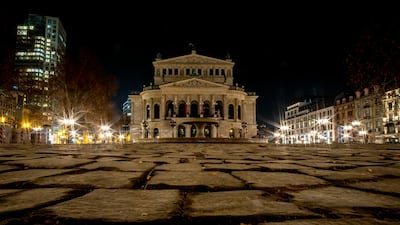At 7.30am local time, the Munich Security Conference began its official, but closed-door, programme, with a series of breakfasts tackling issues of security, diplomacy and how to mitigate the many risks facing the world.
However, it will be at 1.30pm that the public programme and official opening kicks off, with a session entitled “International Co-operation in a time of mounting crises and meeting global challenges”.
While the session includes the UN Secretary General Antonio Guterres as the main representative of “international co-operation”, it is dominated by Europe and the US, with their global viewpoints.
German Minister for Foreign Affairs Annalena Baerbock and US Secretary of State Anthony Blinken will address the conference, followed by US Vice President Kamala Harris.
There is a sense of change across the board in Munich this year.
A new German government is taking the helm and its key actors, including the chancellor, foreign and defence ministers, are speaking on stage and holding a multitude of meetings to unveil their policies and approach to global affairs.
It is also the meeting in which Wolfgang Ischinger, chairman of the Munich Security Conference, will hand over the leadership of the conference after 14 years.
Christoph Heusgen, who has often been described as former German chancellor Angela Merkel’s closest diplomatic and security adviser, takes the helm at this conference and gives a sense of continuity that many who cherished Ms Merkel’s approach will appreciate.
A notable absence this year will be the security and foreign policy situation in Afghanistan after last summer's withdrawal of US and Nato forces from the country. While a handful of sessions at this year's summit will address the issue of militancy, there are no dedicated sessions on the Afghanistan and little attention being paid. No representative from the country will be in attendance either.
Twenty years after the invasion of Afghanistan, it appears the policy and security leaders in Europe and America would rather step away from probing the disastrous withdrawal, to heal transatlantic rifts and disagreements.
Of course, the unifying factor is the shadow of a possible war in Ukraine.
There is a marked absence of Russian officials and diplomats from the event, with a multitude of side meetings and discussions on how to deal with Russia and the possibility of war.
Ukrainian President Volodymyr Zelensky is among a number of Ukrainians attending the conference.
The question of “will Russian President Vladimir Putin invade?” is hanging over the event, with a wider question of how Europe and Nato will emerge from this current crisis, having not yet dealt with the ramifications of the Afghanistan withdrawal six months ago.
The issues of climate, the Sahel and the possibility of a nuclear deal with Iran are expected to be tackled, but are in many ways secondary to Ukraine discussions and developments.
Of course, one major change at the Munich Security Conference this year is the effect of the Covid-19 pandemic.
Delegates attending the conference began to congregate on Thursday, with many trying to figure out the intricate and detailed instructions given by the organisers about Covid-19 measures.
In addition to daily Covid-19 testing and the need for proof of vaccination, the organisers have initiated a system of daily colour-coded wristbands and face masks to quell any Covid-19 cases.
Without a negative PCR test result in the past 24 hours, no delegate can attend the conference – and there are no exceptions.
One thing this event does not want to be remembered for is as a super-spreader event. If it can succeed in bringing hundreds of people together in close contact, it could end up setting a precedent for how international gatherings can happen in the current climate.
Even more importantly, it does not want to be remembered as the event where western leaders gathered to talk as Mr Putin acted on the ground.







































